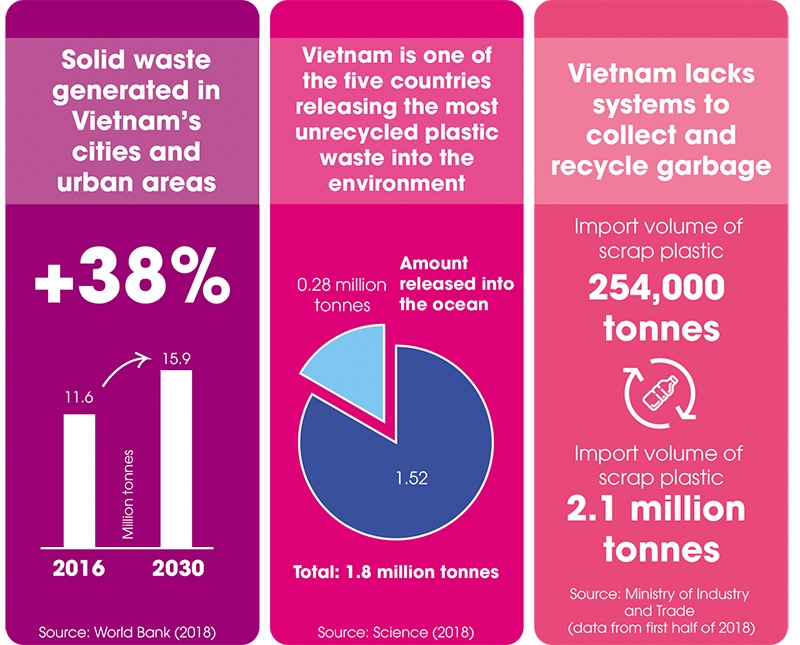Multi-stakeholder effort necessary for plastics reduction
 |
Do Thai Vuong, vice chairman of Unilever Vietnam, told VIR that the lack of regulations on boosting the recycling industry will lead to trouble in collecting and recycling plastic waste in urban areas.
According to information published at the national conference on sustainable development last week, Vietnam was one of five countries polluting the ocean with unrecycled plastic in 2018. In addition, the 49 per cent growth in the country’s urban solid waste generation by 2030 ranked it fourth in Southeast Asia.
Even as plastic waste keeps increasing, the nation imports large amounts of raw plastic materials. According to the General Department of Customs, in the first two months of this year, Vietnam imported 933,000 tonnes of raw plastic worth $1.36 billion, up 13.15 per cent on-year in volume.
Importing raw plastic has been setting a burden on companies. Vuong said that instead of investment in technology and manufacturing lines, companies spend a lot on raw plastic materials.
While businesses do make strong efforts to collect and recycle garbage, they cannot deal with the problem alone. “What we can do is to reduce the harmful effects of our own plastic garbage. However, to reach a comprehensive solution, the Ministry of Natural Resources and Environment (MoNRE) and other stakeholders need to be on board,” said a beverage company’s representative.
Speaking at the national conference on sustainable development, Minister of Natural Resources and Environment Tran Hong Ha stated that shifting to recycled materials is an inevitable trend for any economy. “Recycled materials play an important role in helping Vietnam create a circular economy and lengthen the longevity of all kinds of materials and to narrow negative impacts to the environment,” said Ha.
Nguyen Le Hang, deputy general director cum sustainable development director of An Thanh Biscol (a member of An Phat Holdings), said, “Recycled and eco-friendly products should be incentivised, just as the South Korean government has been subsidising companies specialised in eco-friendly products.”
Vuong from Unilever Vietnam said that the government should issue specific regulations to encourage various economic sectors to team up in recycling garbage. It is necessary to issue comprehensive solutions to create a tight connection among material suppliers and waste treatment companies, he added, to supply recycled plastics to producers at a reasonable price, helping them to cut manufacturing costs.
At the conference, the Ministry of Science and Technology (MoST) also published a plan of creating legislation promoting sustainable development and the circular economy. Accordingly, directions on boosting science, technology, and innovation (STI) have been added to the National Action Plan on the Implementation of the 2030 Sustainable Development Agenda. This is an inevitable foundation for the materialisation of other STI activities.
Accordingly, the MoST will craft policies to encourage companies, universities, and institutes to join the government’s innovation initiative. In addition, the ministry will apply international management models to improve the outcomes of public investment in researching science and technology. Moreover, the public private partnership model will be piloted at state-owned companies by shifting from state-funding to co-financing models.
Drafting appropriate legislations on garbage collection and recycling is fast rising on the agenda as the 21st century is opening up a new era where green energy and recycled materials are key factors in developing a circular economy, according to Minister Ha. “With mounting production and consumption leading to vast amounts of plastic waste in Vietnam, creating suitable legislation on plastic reduction is complicated. The first steps should be enhancing public awareness on the negative effects of plastic waste, which all stakeholders should carry out thoroughly,” Ha said.
What the stars mean:
★ Poor ★ ★ Promising ★★★ Good ★★★★ Very good ★★★★★ Exceptional
 Tag:
Tag:
Related Contents
Latest News
More News
- Congratulations from VFF Central Committee's int’l partners to 14th National Party Congress (January 25, 2026 | 09:46)
- List of newly-elected members of 14th Political Bureau announced (January 23, 2026 | 16:27)
- 14th Party Central Committee unanimously elects To Lam as General Secretary (January 23, 2026 | 16:22)
- List of members of 14th Party Central Committee announced (January 23, 2026 | 09:12)
- Highlights of fourth working day of 14th National Party Congress (January 23, 2026 | 09:06)
- Press provides timely, accurate coverage of 14th National Party Congress (January 22, 2026 | 09:49)
- Press release on second working day of 14th National Party Congress (January 22, 2026 | 09:19)
- Minister sets out key directions to promote intrinsic strength of Vietnamese culture (January 22, 2026 | 09:16)
- 14th National Party Congress: Renewed momentum for OVs to contribute to homeland (January 21, 2026 | 09:49)
- Party Congress building momentum for a new era of national growth (January 20, 2026 | 15:00)






















 Mobile Version
Mobile Version